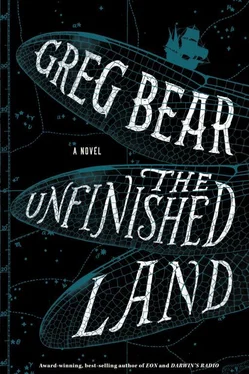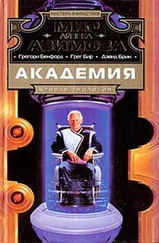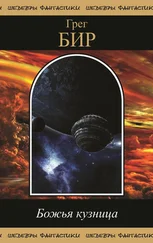“Not until day,” Nikolias insisted. “Who knows what mood ruleth spirits here?”
The others marked themselves and inclined their heads. Calafi climbed up onto the wagon, and Yuchil suddenly reached out and hugged her.
“How can Crafters die?” Yuchil cried. “They were our whole world!”
Reynard snuck away from the fires around the wagon, sticking to the shadows cast by broken trees and low rocks, as if he were himself an Eater.
Nikolias and his three warriors had joined Widsith and Kaiholo and Kern in passing around two great wicker-wrapped jugs of unwatered wine, hidden in the wagon along with everything else, and controlled by Yuchil… But the day had been so disheartening that Nikolias felt a little imbibing was in order, and Yuchil did not disagree.
They spoke very little.
But Reynard did not drink, and made his way quietly toward the outer fence.
The stockade had pillars of rounded boulders caulked with straw-mud and spaced with long lines of interwoven sticks and stalks not unlike the core of a field barricade in England, the sort meant to discourage bulls. The stockade had been broken through in several places, likely by soldiers. There were many marks of feet and hooves, but no sign of battle.
He stepped over a tangle of branches and through a gap and approached the rock foundation that rooted one great rib as it rose above the fields, above this part of the stony flats, to join with side arches that supported many floors, interconnected by thick rigging, ladders, and bridges, their lines and backstays hanging in sad tatters from curved masts, like a stricken ship rising out of a stony sea. He looked at the floor, paved with small pebbles, and saw a thick carpet of what might have once been leaves, now black with mold—as if the city had once been part of a great tree.
Reynard touched the base of the rib, and his hand found a long crack, then, around the circumference, another. The huge rib had been shivered several times along its lower length. How long would it hold? Had it always had such cracks, as sometimes showed in great masts?
He turned. The darkness was so deep it seemed bootless to venture farther. But then he caught a gleam behind him. The darkness was slowly being broken by what seemed at first to be fireflies, but which he soon made out as tiny flowers sprouting from vines that laced around the ropes and supports—flowers that glowed in the night. He approached one such vine and saw for a moment what he thought was a childer—
But it vanished.
The pale, dim light from the flowers showed him that just beyond a broken gate a narrow staircase lifted into the heights in a corkscrew, like an inside stair in a large ship. He could not see what waited at the top. Going higher might be invading the privacy of those Travelers who once served Crafters—and who survived being near them! What powers could those dead exert? What resentment, leading to what revenge? What magic had the Crafters passed to their servants? Not enough perhaps to keep them alive, or fend off the Sister Queens’ armies.
Still, he wondered if it would be the better part of valor to just stop here and return to the wagon and the fires, the wine and the bread…
But then he saw a candle glowing about a third of the way up the steps, a tall candle that had not been there before and seemed to have been placed to guide him—even when no hand could have set it there.
He crossed the threshold of the broken gate and slowly, carefully climbed the steps to the candle, hand on the curved railing. He stood looking down at the flame, burning steady and putting out a tendril of smoke. Then a slight breeze flickered the flame and played with his hair.
“Are you here somewhere, magician?” Reynard whispered.
Came no answer.
But this would be a good place to gather sticks, if not beef and sheep bones. That is, should a magician wish to assemble swevens or topplers or other helpers.
Bone-wives.
He turned at a scuff.
Widsith came up behind him, followed by Calafi.
“She told me you had gone into the city.” The Pilgrim did not seem angry. The tangle-haired girl favored Reynard with a guileless smile, then studied the flowers.
Now three more childers appeared and hovered around them—around the girl, actually. Their translucent faces smiled beatifically upon her. She held up her hands as if to caress them, but they all disappeared, again like soap bubbles.
“I saw a candle,” Reynard said, pointing. “I see one now.”
Both looked to where he pointed. “I see nothing,” Widsith said, and Calafi shook her head. “I always thought the magician far too old to travel. He hath for centuries been a fire burning low, and Eaters cannot replenish him. Do you sense his presence?”
Reynard shook his head. “But I saw another candle, far back, and now this one. Why show candles to me alone?”
The candle burned low in its holder, and the flame flickered as if about to go out.
They looked to the Pilgrim as if he might have an answer, having known the magician for so many years. “As guide for you,” Widsith said.
Calafi said, “Maybe he is dead.”
“Then how could he place candles?” Reynard asked.
Widsith did not seem to find the notion incredible. “His bone-wives, mayhaps. After death, he could make puppets to carry out his final wishes. Each puppet would last the length of a candle. Before the candle went out, the puppet would need to make another like itself… A jagged existence, but it hath a seeming of Troy. If he be dead.”
“But why show only me?” Reynard asked.
“Let us climb higher,” Calafi said. “The magician may have found something to show us all.”
They resumed their climb up the stairs and entered a twisting shaft of rising columns wound through with vines and the tiny pale flowers. The overall silence in the city was broken by distant snaps and cracks, and a continuous rustling, as of branches in a wind-tossed tree.
For a time, Reynard wondered if the cracked ribs would all split and sag at once, and the entire city would fall in on itself…
Then they came to a round arched doorway accessing a curved corridor, leading to many other round doors on both sides. In the middle of the corridor, a single childer floated, softly imbued with its own light, its own distant existence, paying them no attention. Then it seemed to startle, turned, regarded them with translucent eyes—and floated swiftly into a doorway.
“Do we go there?” Reynard asked.
The girl nodded. “Only look,” she said. “The city still doth contain many spirits. We do not touch or move anything!”
They passed into the next room, and saw it was wide and high-ceilinged but maintained the woven, rigged, and airy design of the rest of the city. The wicker floor was marred by signs of struggle—the marks of axes and sword blades, scraps of cloth, a robe tossed aside—but no blood, no bodies from any combatant or inhabitant.
Reynard was alarmed by this lack. “Where are they all, those who lived here?” he asked.
“Many have likely been taken as slaves,” Widsith said. “But how none who fell remain… I do not know.”
“Few fell, and many were taken,” said a voice behind them, and Nikolias passed through the round door to join them. He carried a lantern and lifted it to reveal the room’s deeper contents. “I have never been this far and seen so much. But I do know that the servants lived in their own kind of luxury, and perhaps valued life too much.”
There were panels, like unto those that appeared in Zodiako over the corridor leading to the hall, but much larger, covered with arts and conceptions half sculpture, half paint, with much gilding to show sun and day.
Nikolias shined the lantern light along the closest panel and said, “Observe a plan, or a dream, or a fancy. All are the same to the servants of Crafters. Here was a Crafter design, being sketched and considered by masters of all arts and artifice… But here, our own people provided the details.” His expression showed both sorrow and pride.
Читать дальше







